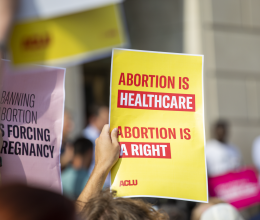Last Wednesday, the U.S. House Appropriations Committee passed the Aderholt Amendment, a bill that could deny immigrant women’s access to abortion care. The Aderholt Amendment would amend the Department of Homeland Security Appropriations Act to ban the use of Immigration and Custom Enforcement (ICE) funds to pay for abortion care for detainees, except in cases of rape, incest, or life endangerment. This part of the amendment is redundant, at best. The Hyde Amendment already prohibits the use of federal funds for abortion care, only making exceptions in the aforementioned limited circumstances. Currently, ICE policy falls in line with the Hyde Amendment; the Aderholt Amendment would codify this policy into law. But the Aderholt Amendment goes beyond the stipulations in the Hyde Amendment. What’s particularly problematic with the amendment is that it includes language that would allow ICE employees to refuse “to perform, or facilitate in any way the performance of any abortion.” Here is the language for the bill.
This amendment is a politicized attack on the health care access of some of the most vulnerable women in our society. Being detained in ICE lock-up is a well-documented hardship for women. In addition to living in deplorable conditions and being separated from their families and health care providers, some women are also subject to sexual assault, while others are denied crucial medical treatment. This amendment can further compromise the health of a detained woman. On its surface, the amendment is discriminatory because it implies that only women with private insurance should have access to a full range of reproductive health care. Beyond that, the proposal undermines reproductive health care access for all detained women. Because of the amendment's broad employee refusal clause, an ICE employee could refuse to participate in the transport (emergency or otherwise) of any woman who is attempting to obtain an abortion.
This is the third time the Aderholt Amendment has been introduced. In 2013, the ACLU recommended a “no” vote on the amendment, stating that the amendment represented an attempt “to make meaningful abortion access as difficult as possible.” Last week, the ACLU joined the National Latina Institute for Reproductive Health (NLIRH) and 65 other organizations in signing a letter opposing the amendment. The letter acknowledges that this amendment is an example of politicians interfering with a woman's ability to make important health care decisions. The letter also acknowledges that this amendment comes into conflict with the strides that policymakers and advocates have been taking to improve the humanitarian conditions for women in detention. This amendment moves us backwards by making “an already dire circumstance even more difficult for women in federal immigration custody.”






